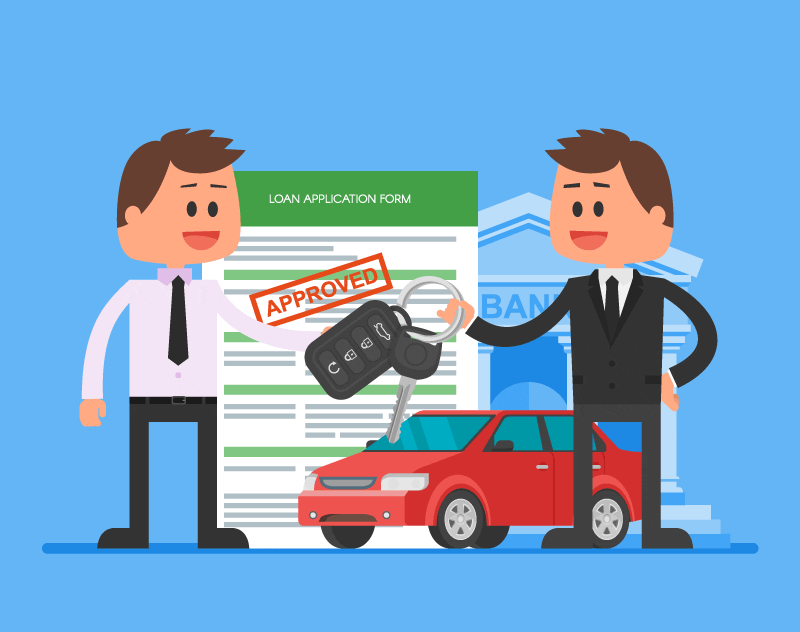Buying a car can be a complex process, especially when encountering terms like OAC in pricing information. What does OAC mean, and how does it affect your car financing experience? In this comprehensive article, we will delve into understanding OAC financing when buying a car and explore its implications.
Essentially, OAC financing means that in order to qualify for the advertised financing offers, you need to have a credit profile that meets the lender’s criteria. The terms and conditions associated with OAC financing are typically more favorable than those for individuals with lower credit scores or less creditworthiness.
For example, you might see an offer for 0% APR financing, which means you wouldn’t have to pay any interest on your car loan. However, this offer would likely be available only to customers who have been approved for it based on their creditworthiness. If you don’t meet the credit requirements, you may still be able to get financing but at a different interest rate.
Having a higher credit score generally improves your chances of being approved for special financing offers and more favorable terms. Lenders consider factors such as your credit history, income, employment stability, and debt-to-income ratio when evaluating your creditworthiness.
Understanding OAC Financing When Buying a Car

Understanding OAC financing is important because it helps you make informed decisions when buying a car. If you have a good credit score, you may have access to better financing options and be eligible for special offers. On the other hand, if your credit score is lower, you may need to explore alternative financing options or work on improving your credit before obtaining the most favorable terms.
Qualifying for OAC financing, especially with a less-than-perfect credit score, may require additional steps and considerations. While those with excellent credit profiles may be approved for advertised financing rates without significant hurdles, borrowers with lower credit scores can explore alternative approaches:
- Co-Signer or Down Payment: To enhance your chances of approval, having a co-signer or making a down payment can provide lenders with more assurance of your ability to meet monthly payments.
- Credit Building: Even if you qualify for OAC financing, it’s essential to work on improving your credit for future endeavors. Building credit involves managing your finances responsibly, making payments on time, and reducing overall debt.
What Does OAC Mean When Buying a Car?
“OAC” stands for “On Approved Credit.” It’s a term often used in the context of car financing and loans. When you see “OAC” in-car advertisements or financing offers, it means that the terms and conditions being advertised, such as interest rates or monthly payments, are contingent on the buyer’s creditworthiness being approved by the lender.
In other words, the specific financing terms that are being advertised might only apply if the buyer’s credit score and financial history meet the lender’s criteria for approval.
If your credit is not deemed strong enough, you might not qualify for the advertised terms, and the actual terms of the financing could be different.
It’s essential to remember that the terms “OAC” or “On Approved Credit” indicate that the offer is subject to a credit check and approval by the lender.
If you’re considering purchasing a car and taking advantage of a financing offer, it’s a good idea to check your credit score and history beforehand to get an idea of your creditworthiness and potential eligibility for the advertised terms.

How To Get OAC Financing
To qualify for OAC (On Approved Credit) financing, you’ll need to follow a few steps to improve your chances of being approved for favorable financing terms:
- Check Your Credit Score: Obtain a copy of your credit report and check your credit score. This will give you an idea of where you stand in terms of creditworthiness. You can get a free copy of your credit report from each of the major credit bureaus (Equifax, Experian, and TransUnion) once a year.
- Improve Your Credit Score: If your credit score is lower than you’d like, work on improving it before applying for financing. Pay your bills on time, pay down existing debts, and correct any errors on your credit report.
- Calculate Your Budget: Determine how much you can comfortably afford to pay each month for a car loan. This will help you choose a financing option that fits within your budget.
- Research Lenders: Research different lenders, including banks, credit unions, and online lenders, that offer OAC financing. Compare their interest rates, terms, and requirements to find the best fit for your situation.
- Gather Documentation: Lenders will require documentation to assess your financial situation. This may include proof of income, employment verification, proof of residence, and possibly other financial records.
- Apply for Pre-Approval: Before you start shopping for a specific car, consider applying for pre-approval with one or more lenders. Pre-approval involves submitting your financial information to a lender, who will then provide you with a tentative loan offer based on your creditworthiness.
- Shop for Cars: Once you have a pre-approval or an idea of the financing you might qualify for, you can start shopping for cars within your budget. Keep in mind the monthly payment and total cost of the loan.
- Negotiate with Dealerships: If you’re purchasing from a dealership, they may offer their own financing options. Compare these offers to the pre-approved financing you’ve secured. Sometimes dealerships can offer competitive rates, but be sure to read the fine print.
- Finalize the Loan: Once you’ve chosen a car and negotiated the price, the lender will finalize the loan terms based on your credit history and financial situation. Review the terms carefully before signing any agreements.
- Complete the Process: Provide any additional documentation required by the lender, sign the loan agreement, and complete any necessary paperwork. Make sure you understand the interest rate, monthly payments, and any fees associated with the loan.
Remember that OAC financing is not guaranteed. Lenders will assess your creditworthiness and financial situation to determine whether to approve your loan application and at what terms. It’s important
How To Finance a Car in 4 Steps
Financing a car involves securing a loan to purchase the vehicle. Here’s a simplified breakdown of the process in four steps:
- Determine Your Budget and Research Financing Options:
- Calculate your budget: Determine how much you can afford to spend on a car while considering your monthly income, expenses, and any down payment you can make.
- Research lenders: Explore various lenders, such as banks, credit unions, online lenders, and even dealerships. Look for competitive interest rates and terms that suit your budget.
- Get Pre-Approved for a Loan:
- Choose a lender: Select a lender that offers favorable terms and aligns with your financial situation.
- Apply for pre-approval: Submit a loan application with the lender. They’ll review your credit score, income, and other financial factors to determine the loan amount you’re eligible for and the interest rate you qualify for.
- Pre-approval benefits: Pre-approval gives you an idea of your budget and helps you negotiate confidently with dealerships or private sellers.
- Select the Car and Finalize the Loan:
- Choose a car: Based on your budget and pre-approved loan amount, select a car that meets your needs and preferences.
- Negotiate the price: If buying from a dealership or private seller, negotiate the car’s price. Having pre-approval can strengthen your negotiation position.
- Finalize the loan: Once you’ve agreed on the price, the lender will finalize the loan terms. This includes determining the interest rate, loan duration, and monthly payments. Review and understand the terms before proceeding.
- Complete the Loan Application and Purchase:
- Submit documentation: Provide the required documentation to the lender, which may include proof of income, identification, and insurance information.
- Sign the loan agreement: Once the lender approves your application and reviews your documentation, you’ll sign the loan agreement. This legally binds you to the terms of the loan.
- Take possession of the car: After completing the loan process, you can take possession of the car. If you’re buying from a dealership, they’ll handle the paperwork and registration on your behalf. If buying from a private seller, ensure all necessary paperwork is completed correctly.
Remember that securing a car loan involves interest charges, so it’s essential to understand the total cost of the loan over its duration.
Take your time to compare offers, negotiate effectively, and read all terms and conditions carefully before finalizing the loan agreement.
Tips for Improving Creditworthiness
Improving your creditworthiness is important for obtaining better interest rates and financing options. Here are further explanations of the tips provided to enhance your creditworthiness:
- Increase Earnings: One way to improve your creditworthiness is to increase your income. Supplementing your earnings through overtime or part-time work can help lower your debt-to-service ratio. This ratio compares your total monthly debt payments to your monthly income.
- Timely Payments: Paying your bills on time is crucial for maintaining a good credit score. Delinquencies, which are late or missed payments, can have a negative impact on your credit report. Lenders and credit reporting agencies consider your payment history when evaluating your creditworthiness. Consistently making timely payments shows that you are responsible with credit and increases your creditworthiness.
- Debt Management: Managing your debt effectively is another key aspect of improving your creditworthiness. Reducing your overall debt load can positively impact your credit score. Lenders consider your debt-to-income ratio, which compares your monthly debt payments to your monthly income. Lowering your debt lowers this ratio, demonstrating a reduced risk to lenders.
Additionally, it’s important to maintain a lower credit utilization ratio. This ratio measures how much of your available credit you are currently using. Keeping your combined credit card balances below 30% of your total credit limit is generally recommended. This shows that you are not overly reliant on credit and are using it responsibly, which can boost your creditworthiness.
Related Search: 10 Cheap Rental Car Hacks That Will Save You Money
Alternatives to OAC Financing
If you’re not eligible for OAC financing or prefer to explore different avenues, there are alternative approaches to finding affordable and favorable vehicle deals:
- Strategic Timing: Timing your dealership visits strategically can yield significant savings. Certain days, weeks, or months may offer better deals or incentives from dealerships.
- Pre-Owned Vehicles: Consider purchasing a pre-owned car, as the used car market often provides affordable options. Ensure thorough inspections and research to find the best deals and reliable vehicles.
- Negotiation: Basic negotiation skills can help you negotiate a better price for the car, potentially saving you hundreds of dollars.
- Pre-Approval: Getting pre-approved for financing allows you to know your budget before browsing vehicles. It empowers you with the knowledge of how much you can afford and enhances your bargaining power with dealers.
Conclusion
Understanding OAC (On Approved Credit) financing is essential when buying a car. It indicates that the attractive financing terms advertised are subject to credit approval. While some may not qualify for OAC rates, there are various approaches to securing affordable vehicle deals. Building and improving credit can lead to better interest rates and financing options in the future. Alternatively, shopping strategically, considering pre-owned cars, negotiating, and getting pre-approved are viable alternatives. By considering these options and understanding the implications of OAC, you can make well-informed decisions that align with your financial circumstances and vehicle needs.
People Also Ask
1. What does OAC mean when buying a car?
OAC stands for “On Approved Credit.” It indicates that the financing terms being advertised are contingent upon approval based on your credit rating. To qualify for the advertised financing offers, you need to meet the lender’s credit requirements.
2. How does OAC financing affect my options when buying a car?
OAC financing impacts your options by determining the financing terms you qualify for. If you have a higher credit score, you are more likely to be approved for special financing offers and more favorable terms. On the other hand, if your credit score is lower, you may have fewer options or be offered less favorable terms.
3. How can I improve my creditworthiness?
Improving your creditworthiness involves several steps:
– Make timely payments on all your credit obligations, including credit cards, loans, and utilities.
– Reduce your overall debt by paying off existing balances and avoiding new debt.
– Keep your credit utilization ratio below 30% by using a smaller portion of your available credit.
– Consider supplementing your income through overtime or part-time work to lower your debt-to-service ratio.
4. How long does it take to improve my credit score?
According to Aqua Card, “Depending on your unique financial situation, it can take anywhere from one month to a few years to improve your credit score. Improving your credit score isn’t something you can achieve overnight, but don’t let that dishearten you. Every credit score can be improved with a little commitment and perseverance.
How long it will take you to see improvement isn’t a fixed amount of time. It depends largely on these two factors:
- How bad your credit history is
- What action you’re taking to improve it”
5. Can I still get a car loan with bad credit?
Yes, it is still possible to get a car loan with bad credit. However, you may face challenges in securing favorable terms or may need to explore alternative financing options, such as subprime lenders or buy-here-pay-here dealerships. It’s important to research and compare different options to find the best fit for your situation.
6. Will checking my credit score affect my creditworthiness?
No, checking your own credit score does not impact your creditworthiness. When you check your own credit score, it is considered a soft inquiry, which does not affect your credit. However, when lenders or financial institutions make inquiries into your credit as part of a loan application, it can have a slight impact on your credit score.
Remember, it’s always a good idea to consult with a financial advisor or credit counselor for personalized advice regarding your specific financial situation.



